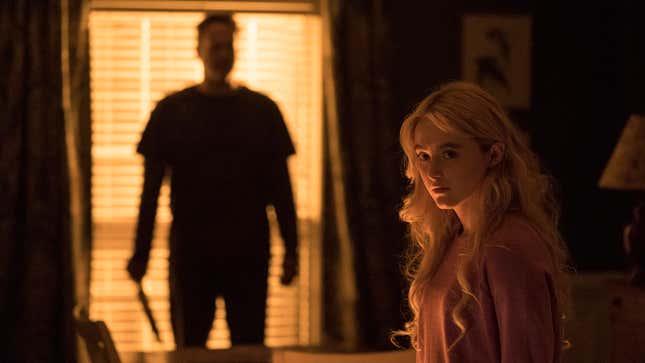

In a way, the slasher subgenre functions like its movies’ antagonists: It refuses to die. Just when you think it’s gone for good, it gets back up and resumes its carnage. It has long felt like it’s about to perform its one last scare, but that has yet to manifest. It owes its endurance to evolution—at some point in the late ’80s, a guy running around and knocking off characteristically blank teens could no longer hack it. So then came the self-aware slasher, perfected by Scream in 1996—it proved regurgitating the same old tropes could be downright delightful if they were commented upon in the text itself.
The modern slasher is less brainy than sensitive: The 2018 Halloween sequel was a smash with socially conscious pretensions (really it was just another watchable Halloween movie). And now we’re being treated to Christopher Landon’s Freaky, a mash-up horror flick along the lines of the director’s 2017 movie Happy Death Day, which took the temporal-loop concept of Groundhog Day and made it gruesome. Freaky is like something out of Jeopardy!’s Before and After category rendered into cinema—its full title could have been Freaky Friday the 13th. It melds the body-swap hijinks of Freaky Friday, with the body-count fetishism of Friday the 13th. The formula, derivative as it is, is a lightning bolt to the central nervous system of a subgenre that’s been on the brink of creative bankruptcy since Jason Voorhees first showed his disfigured face.
Freaky starts like a typical teen hack-’em-up, albeit a tart-tongued one with a particular flair for identity matters. A few high school students sit around outside the mansion in which one of them lives and discuss the local legend of the Blissfield Butcher, who killed a bunch of kids in the ’90s. He’s long since disappeared but his potential reemergence is perpetuated every year around homecoming. That would make him geriatric now by these kids’ standards, but as one of the girls notes: “Don’t underestimate a straight white man’s propensity for violence, I don’t care how fucking old they are.” These are sage words, as a Jason-esque masked brute soon appears to off them all. You can practically see the wheels in Landon’s and co-screenwriter Michael Kennedy’s heads turning as they devise hilariously absurd methods of death that rival the best Friday the 13th kills, including a broken-off wine bottle down one boy’s throat and a split tennis racket effectively reassembled inside one of the teen’s heads. The brazenly R-rated Freaky immediately proves itself capable of hanging with the franchise to which it owes its nihilistic pulse.
-

-

-

-

-

-

-

-

-

-

-

-

-

-

-

-

-

-

-

-

-

-

-

-

-

-

-

-

-

-

-

-

-

-

-

-

-

-

-

-








































